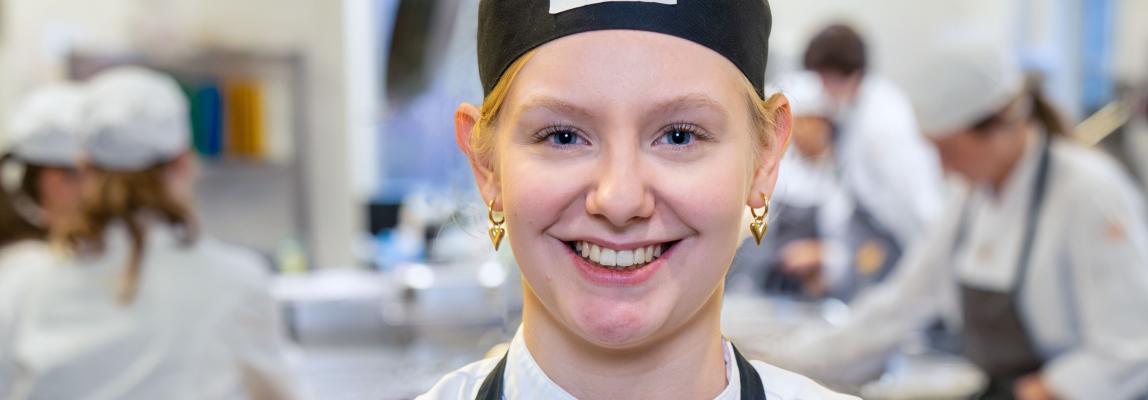
'The perfect place to make mistakes'
01/23/2025 - 13:49
- Stories
In February, second-year student Jasmijn Westein is heading to Melbourne for a placement with Hilton.
‘Yes, super fun and very much looking forward to it! I'm going to do part HR and part Food & Beverage,’ Jasmijn tells me as we have both just cycled to BUas campus in a snowstorm. It’s definitely a great prospect, spending six months in sunny Australia!
‘The past few months have been a good preparation,’ says Jasmijn. ‘I already had quite some experience, but in those weeks at Sibelicious I really felt it, the responsibility you have as a manager. The training company is a nice and also safe place to gain relevant experience, it is the perfect place to make mistakes, and to learn from them, of course!’
Sibelicious is the in-school training company for BUas hotel students, students like Jasmine. But even if you study International Facility Management, you will gain practical experience in the restaurant, kitchen, catering, or other departments of Sibelicious, such as Bar & Banqueting and the Visitor Centre.
‘In your first year of study, you’ll assist in four different departments,’ Jasmijn explains, ‘you are simply assigned to a role, all experience matters – you learn by doing. In the second year, you’ll get to experience what it’s like to manage people. I did that in the production kitchen. That’s the kitchen where food is prepared for all the food outlets on the BUas campus, so not just the hotel school. Suddenly, you’re managing first-year students, which takes some getting used to.’
From assisting in the first year to managing in the second year. How exactly does that work?
‘You are well prepared for it. First you are taught the basics of operational leadership. Then you will make your own operational plan for the week when you’ll be responsible for a department. You do this together with the students who will manage the other departments. After three weeks, the plan has to be ready and then you spend a week shadowing the current student manager. During that week, you are the manager’s assistant. It is an important week, in which you learn a lot from an experienced student and further prepare for your own management week. Eventually, you take charge of your department independently for a week. In the following week, another student shadows you, and you conclude the process with a presentation to reflect on your learning experience.’
And so all students get their turn to gain experience as managers. What did you find difficult?
‘In the week I was working as an assistant, everything went really smoothly, so I actually went into my own management week feeling quite relaxed. I had prepared it all well, including the special of the week for the production kitchen, because that’s part of the responsibility too. But on the very first day, I already had to deal with people calling in sick. I also noticed that some of the students were just less motivated. It was a very diverse group and their enthusiasm levels varied. It really took extra effort to keep everyone engaged and motivated. In my assistant week, we always finished earlier than planned, but as a manager, that didn’t happen at first because of those sick calls.’
So you can prepare as much as you like, but sometimes things turn out differently. How did you fix it?
‘I started asking the managers of the other departments whether they might be able to spare some students. As a management team, you are jointly responsible for ensuring that all departments run well, so you have to work together to find solutions when things start to go wrong somewhere.’
And you succeeded! Do you look back on it with a good feeling?
‘I learnt an awful lot from it. You have to adapt quickly in a week like that, but I believe I made the right decisions. By Wednesday, things really started to run smoothly. I needed to trust my own decisions a bit more, that was the feedback I got from my supervisor. I tend to seek confirmation, but that’s not necessary – most of the time, what I do is just fine. That self-confidence still needs to grow, but my experience at Sibelicious has definitely helped me in that regard.’
And that’s something you can benefit from in Australia! What did you enjoy most?
‘The struggle with the staffing part was not so much fun, of course, but very instructive. And in the end, it was really nice to see that our special went so well. The empanadas we had made with the team sold out in no time! That is not a goal in itself, the goal is above all learning. Making a profit is great, but it's about insight, understanding where costs come from and what numbers really mean. We also had to keep a stock list, which products are still in stock, how can we still use them? You have to use everything as efficiently as possible and avoid waste. That’s how you learn to come up with creative and sustainable solutions and that makes it extra fun!’
Interview: Maaike Dukker-'t Hart